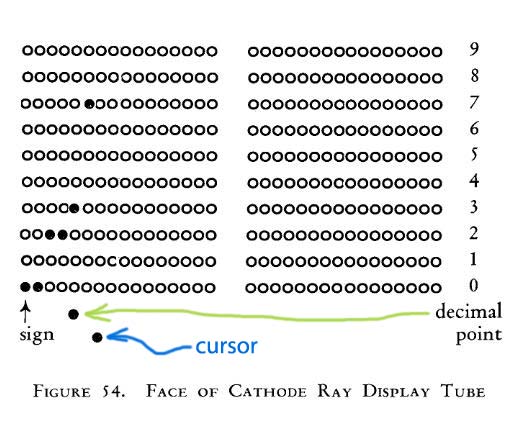
The IBM 610 Keyboard. This is an input device; the big electric
typewriter is an output device (printer). The input keyboard is not for
typing in the normal sense; the keys are more like those of a scientific
calculator — digits and operators. The interesting part is the
circular green screen at left. This gives feedback to the operator,
"echoing" the numbers as they are entered, not as digit characters, but as
dots. As the
operator manual
says, "...a two-inch cathode ray tube for displaying the contents of the
register which stands
selected at any time during the operation of
the machine. There are two rectangular arrays, each sixteen points wide by
ten points high. Reading from top to bottom, the rows correspond to the
digits from 9 through 0. The first column on the left will have a 0 spot on
the face of the tube if the number being displayed is positive, and a 9 spot
if the number .... is negative. The decimal point will appear as a bright
spot below the digit column immediately following the point.
During
entry an additional spot (called the tag) will appear at the lower edge of
the tube face below the digit column that is ready to receive a digit.
This was, in fact, the
very first screen cursor — a visual cue
on a screen indicating the operator's 'current position'; the patent for it
was granted in 1957. In the image above, the number so far entered is
022.37; the dot below digit 3 indicates the decimal point."

 The IBM 610 Keyboard. This is an input device; the big electric
typewriter is an output device (printer). The input keyboard is not for
typing in the normal sense; the keys are more like those of a scientific
calculator — digits and operators. The interesting part is the
circular green screen at left. This gives feedback to the operator,
"echoing" the numbers as they are entered, not as digit characters, but as
dots. As the operator manual
says, "...a two-inch cathode ray tube for displaying the contents of the
register which stands selected at any time during the operation of
the machine. There are two rectangular arrays, each sixteen points wide by
ten points high. Reading from top to bottom, the rows correspond to the
digits from 9 through 0. The first column on the left will have a 0 spot on
the face of the tube if the number being displayed is positive, and a 9 spot
if the number .... is negative. The decimal point will appear as a bright
spot below the digit column immediately following the point. During
entry an additional spot (called the tag) will appear at the lower edge of
the tube face below the digit column that is ready to receive a digit.
This was, in fact, the very first screen cursor — a visual cue
on a screen indicating the operator's 'current position'; the patent for it
was granted in 1957. In the image above, the number so far entered is
022.37; the dot below digit 3 indicates the decimal point."
The IBM 610 Keyboard. This is an input device; the big electric
typewriter is an output device (printer). The input keyboard is not for
typing in the normal sense; the keys are more like those of a scientific
calculator — digits and operators. The interesting part is the
circular green screen at left. This gives feedback to the operator,
"echoing" the numbers as they are entered, not as digit characters, but as
dots. As the operator manual
says, "...a two-inch cathode ray tube for displaying the contents of the
register which stands selected at any time during the operation of
the machine. There are two rectangular arrays, each sixteen points wide by
ten points high. Reading from top to bottom, the rows correspond to the
digits from 9 through 0. The first column on the left will have a 0 spot on
the face of the tube if the number being displayed is positive, and a 9 spot
if the number .... is negative. The decimal point will appear as a bright
spot below the digit column immediately following the point. During
entry an additional spot (called the tag) will appear at the lower edge of
the tube face below the digit column that is ready to receive a digit.
This was, in fact, the very first screen cursor — a visual cue
on a screen indicating the operator's 'current position'; the patent for it
was granted in 1957. In the image above, the number so far entered is
022.37; the dot below digit 3 indicates the decimal point."